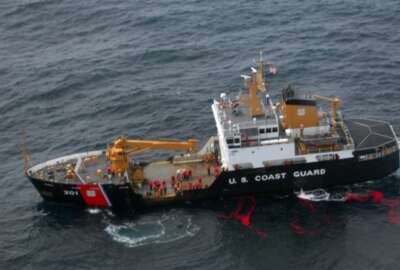Best listening experience is on Chrome, Firefox or Safari. Subscribe to Federal Drive’s daily audio interviews on Apple Podcasts or PodcastOne.
- The Coast Guard is way behind on creating rules to improve safety aboard older commercial fishing vessels. The Government Accountability Office said Congress has ordered the agency to issue safety regulations on 22 distinct issues over the past decade, and the Coast Guard has only complied with five of those requirements. In response to the audit, agency officials said they are working on a new timetable to implement most of Congress’s directions. But that schedule won’t be finalized until the end of 2023.
- The Navy has finished draining the jet fuel pipelines leading from its Red Hill storage bunker near Honolulu, part of the infrastructure that leaked fuel into drinking water supplies last year. The million gallons removed from the pipelines is only part of the process of eventually decommissioning Red Hill. The military still needs to drain the 100 million gallons in the storage tanks themselves. That process is expected to take until 2024. (US military finishes draining Pearl Harbor fuel pipelines – Federal News Network)
- The Centers for Medicare and Medicaid Services is trying to ferret out misleading marketing in the Medicare Advantage program. During this year’s Medicare open season, CMS is using “secret shoppers” to call insurance marketers that seem to be offering misleading information, or plans that seem too good to be true. The agency is also requiring insurance agents to record their own calls with customers so it can better investigate the fraud claims it receives. CMS saw a big spike in complaints about deceptive marketing last year: 40,000, compared to 15,000 the year before. (Medicare enrollees warned about deceptive marketing schemes – Federal News Network)
- The cyber dashboard run by CISA is in line for its next upgrade. The continuous diagnostics and mitigation program has implemented its dashboard at 89 agencies, 78 of which received the latest upgrade. The Cybersecurity and Infrastructure Security Agency already is planning to move to version six and add cross cluster search capabilities governmentwide. Currently 20 agencies are testing out cross cluster search, which lets CISA and agency leaders take a deeper dive into the data to look for real or possible vulnerabilities. CISA recently saw the value of cross cluster search in helping agencies deal with the OpenSSL 3 threat.
- Defense Department employees and servicemembers with electric cars will have an easier time charging their vehicles in 2023. The Defense Innovation Unit is running a pilot program at eight military bases across the country to install modern EV charging technology. The stations will be both midrange and fast-charging stations, and be available for government and personal vehicles. Once the on-base charger installation phase is complete, DIU will run a yearlong analysis to measure usage; uptime; vehicle types, be they government or personal; wait times; and mean time to repair. As part of the pilot program, DIU will evaluate the viability of “charging-as-a-service” payment models to defray DoD EV infrastructure investments.
- An industry group is pushing for more flexible classified workspaces. The Intelligence and National Security Alliance (INSA) is recommending spy agencies build and certify shared Sensitive Compartmented Information Facilities (SCIFs). INSA said it will give intelligence officers and analysts more flexible workplace options. And it would also give small businesses a better chance to compete for classified contracts. The Senate’s version of this year’s Intelligence Authorization Act also requires a comptroller general review of the annual average utilization of SCIFs across government and industry.
- Unions are accusing the Bureau of Engraving and Printing of bargaining in bad faith. Multiple unions representing BEP employees sent a letter to Sens. Chris Van Hollen (D-Md.) and Ben Cardin (D-Md.) asking for intervention on their behalf. The unions allege BEP is delaying negotiations on new union contracts, which has led to multiple workplace grievances being filed, and a drop in workplace morale. The unions include the International Association of Machinists and Aerospace Workers, the Graphic Communications Conference of the International Brotherhood of Teamsters, the Washington Plate Printers, and the Fraternal Order of Police.
- Veteran homelessness dropped 11%, according to the 2022 Point-in-Time Count conducted by the departments of Veterans Affairs and Housing and Urban Development and the Interagency Council on Homelessness. The count, conducted in January 2022, found that there were just over 33,000 homeless veterans in the country, down from over 37,000 in 2020. According to the VA, this was the biggest drop in veteran homelessness in five years. Additionally, VA said it is well on the way toward its goal of re-housing 38,000 veterans in 2022. The agency said it has already placed 31,000 homeless veterans in permanent housing.
- The Election Assistance Commission (EAC) has received high marks for its cybersecurity efforts. An inspector general’s audit of the EAC’s compliance with federal cyber standards found the commission has an effective information security program. But it did flag some areas for improvement. The audit recommends EAC do a better job of consistently resolving known cyber vulnerabilities. It also urged the commission to improve its automated scanning procedures and track software license usage.
Copyright
© 2025 Federal News Network. All rights reserved. This website is not intended for users located within the European Economic Area.





